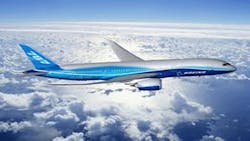NTSB Chides Boeing over 787 Battery Briefing
WASHINGTON -- The U.S. National Transportation Safety Board on Friday criticized Boeing (IW 500/16) for commenting about the 787 battery investigation last week without the board's authorization.
The NTSB, which is leading the probe, said that what Boeing told journalists in its upbeat March 15 progress update represented the 787 maker's own views, and did not have the board's prior approval.
At Boeing's briefing in Japan, home to the 787's biggest customers, Boeing Commercial Airplanes president Ray Conner said he was optimistic the company's battery fix would put the aircraft, grounded internationally since mid-January, back in the skies.
"We are talking more along the line of weeks," he said.
Mike Sinnett, Boeing's chief project engineer on the 787, also said there had been no fire inside the battery on either of the two aircrafts that experienced battery-related incidents. But NTSB spokeswoman Kelly Nantel told AFP Friday that Boeing's briefing represented its own views, and not those of the investigation.
"The NTSB's primary concern is that during their March 15 briefing in Tokyo on the modifications to the 787 battery system, Boeing representatives provided their own analysis and conclusions regarding an ongoing NTSB investigation," Nantel said.
In a letter to Boeing dated Thursday and posted on the NTSB website, the board took issue with Boeing's presentation.
"Boeing is obviously familiar with the NTSB investigative process and its failure to inform the NTSB of the content of the recent technical briefing in Tokyo prior to its occurrence is inconsistent with our expectations for a party," NTSB general counsel David Tochen wrote.
Under NTSB policy, all participants in its accident investigations are limited in what they can say publicly about the probes.
The NTSB is investigating a January 7 lithium-ion battery fire on a parked Japan Airlines (JAL) 787 at Boston's Logan International Airport on January 7.
The US agency also is aiding a Japanese investigation of an overheated lithium-ion battery that forced an All Nippon Airways (ANA) 787 emergency landing in Japan on January 16, leading to the worldwide grounding that day of all 50 787s in service.
The NTSB said on March 7 it was still working to pinpoint the cause of the JAL "787 battery fire."
On March 12, the Federal Aviation Administration, the regulator that will decide whether the 787 returns to service, gave Boeing the green light to test its proposed battery fix.
The Chicago-based Boeing acknowledged Friday that it had received Tochen's letter and insisted it remained "fully committed to support the NTSB and other regulatory authorities in their investigations into the cause of the 787 battery incidents."
Copyright Agence France-Presse, 2013
About the Author
Agence France-Presse
Copyright Agence France-Presse, 2002-2025. AFP text, photos, graphics and logos shall not be reproduced, published, broadcast, rewritten for broadcast or publication or redistributed directly or indirectly in any medium. AFP shall not be held liable for any delays, inaccuracies, errors or omissions in any AFP content, or for any actions taken in consequence.
